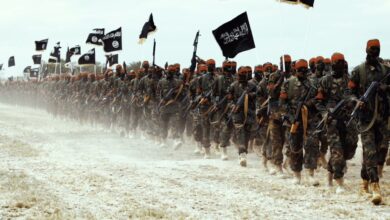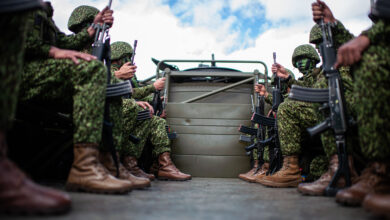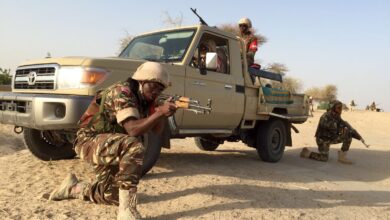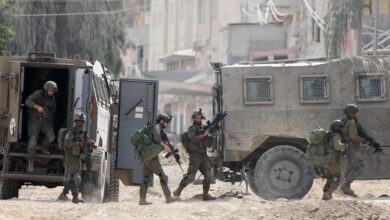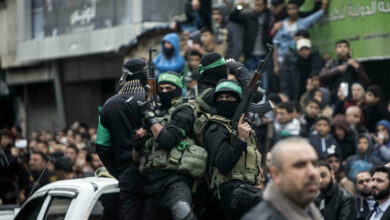A “viable bomb” was found under a Northern Ireland police officer’s car at a golf club in east Belfast on Saturday, June 1.
The discovery was made shortly after 1 p.m. at Shandon Park Golf Club, which is around three miles east of the city centre and around a mile from Police Service of Northern Ireland Headquarters.
“Ammunition Technical Officers were called to the scene and, following examination, they have declared it to be a viable improvised explosive device,” the PSNI said in a release.
“Our belief is that this attempted murder was carried by violent dissident republicans. They don’t care who they attack, they don’t care who they kill. They are simply anti-peace and anti-democracy,” Detective Superintendent Sean Wright, Head of Terrorism Investigation Unit said in the release.
Suspected bomb left under a car at Shandon Park Golf club, a mile away from police headquarters in Belfast.
70 golfers cleared from the course.
Army bomb disposal unit at the scene. pic.twitter.com/lKAbMmVpUG
— Mark Simpson (@BBCMarkSimpson) June 1, 2019
The vehicle was parked at the golf club on Saturday morning, and the scheduled Vice Captain’s Day was cancelled, Belfast Live reported.
Around 70 people were on the course and at least 50 were in the clubhouse when the device was discovered, the BBC reported.
Under-car bomb attacks are rare in Northern Ireland. The New IRA has used what the PSNI describes as under-vehicle improvised explosive devices (UVIEDs) in recent years to target British soldiers, police officers and prison officers in Belfast and Derry.
In February 2017, the New IRA said it was responsible for a bomb that exploded in the driveway of a PSNI officer’s home. The PSNI said that bomb was of a new design and used an “anti-handling device.”
A year earlier, prison officer Adrian Ismay died 11 days after a bomb exploded under his van in Belfast. The New IRA also claimed responsibility for that bombing.
The New IRA is the largest dissident Irish republican paramilitary group, formed in 2012 after a merger of several smaller groups with the Real IRA.
Using a recognized codeword, the Real IRA on April 23 admitted shooting to death journalist Lyra McKee during rioting in the northwestern city of Derry. McKee was shot on April 18 by an unknown gunman who was firing at police in the Creggan area of Derry, also known as Londonderry. She later died from her injuries in hospital.
In January, a car bomb exploded outside a courthouse in Derry, an attack also blamed on the New IRA.
Since then, a number of weapons caches have been uncovered in the southeast of Northern Ireland and just across the border in Ireland.
On April 8, Police Service of Northern Ireland officers recovered a horizontal mortar tube and command wire during an operation near Castlewellan in County Down.
A month earlier, the PSNI uncovered what they called a “significant terrorist hide” of mortar parts, including tubes, in a forested area near Forkhill close to the border on March 6.
A week prior, police uncovered a “sizeable” quantity of ammunition during a search near Omeath in County Louth as part of a follow-up operation targeting the activities of dissident Irish republican groups after Gardaí (Irish police) found a mortar tube and a “substantial” quantity of ammunition in the area on February 1.
Dissident Irish republicans have also taken credit for a series of explosive devices sent to Great Britain in March, with the New IRA claiming they sent four mail bombs that were recovered in London and Glasgow. A fifth “viable device” was discovered at the National Returns Letter Centre in Limerick after it had been returned by the postal service from the United Kingdom.
The 1998 Good Friday or Belfast Agreement ended what is known as The Troubles, three decades of violence in Northern Ireland beginning in the late 1960s in which more than 3,500 people were killed, the majority by predominantly Catholic Irish republicans who want the reunification of Ireland, but also by mainly Protestant loyalists who want Northern Ireland to remain part of the United Kingdom, as well as the security forces.
The violence also spilled over into Ireland, the United Kingdom mainland, and Europe.
The Irish Republican Army called a final ceasefire in 1997 and announced an end to its armed campaign in 2005, stating that it would seek to achieve its aims through peaceful political means, but various dissident Irish republican groups opposed to the peace process have continued to use the name IRA, and there have been sporadic violent incidents since.
Police in Northern Ireland and Ireland have said that a return to a hard border on the island after Brexit could result in an increase in attacks by militant groups.





